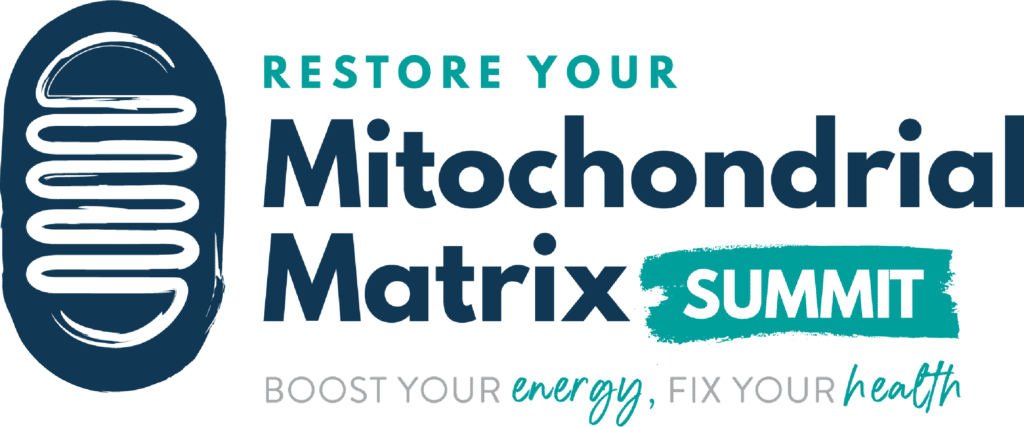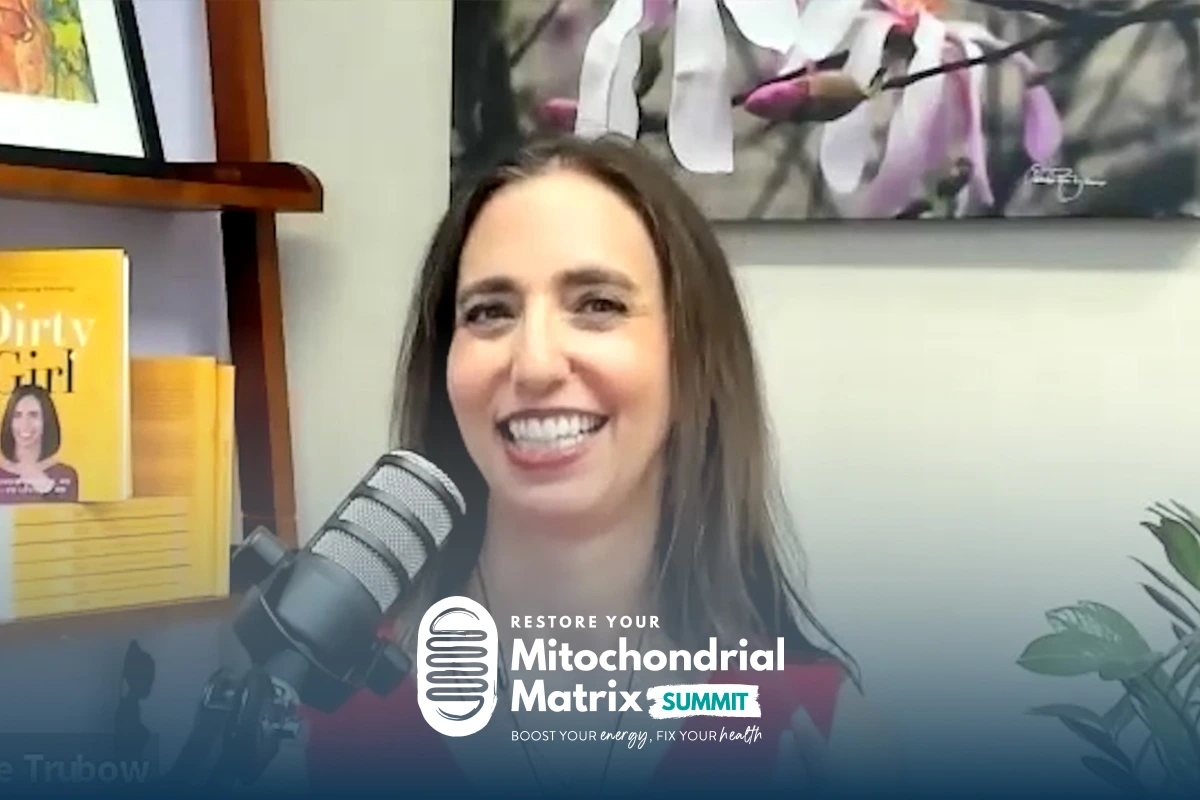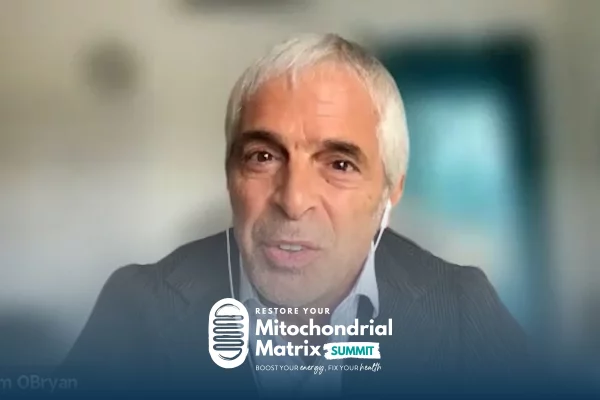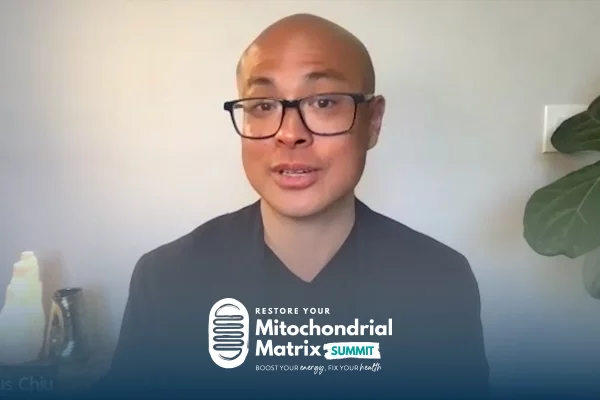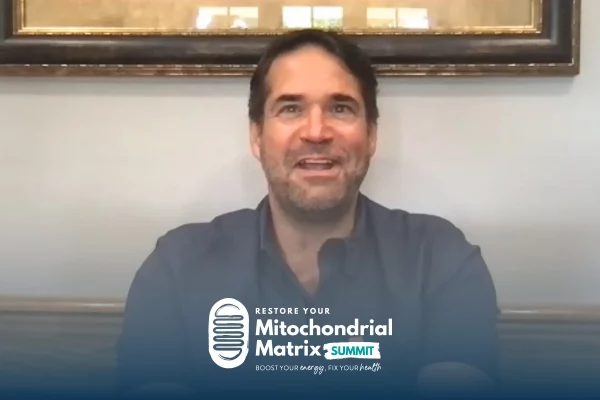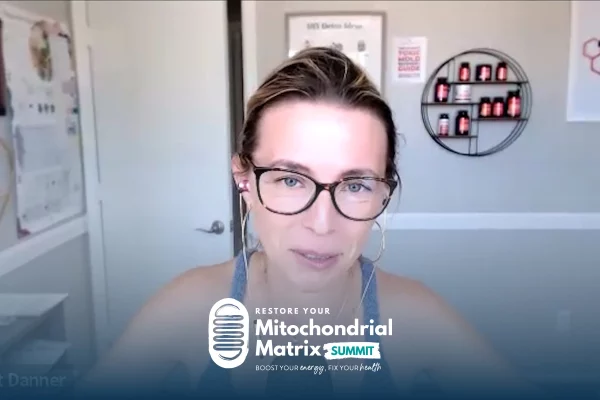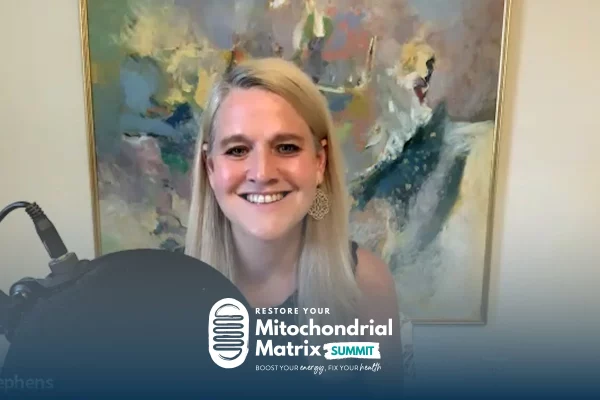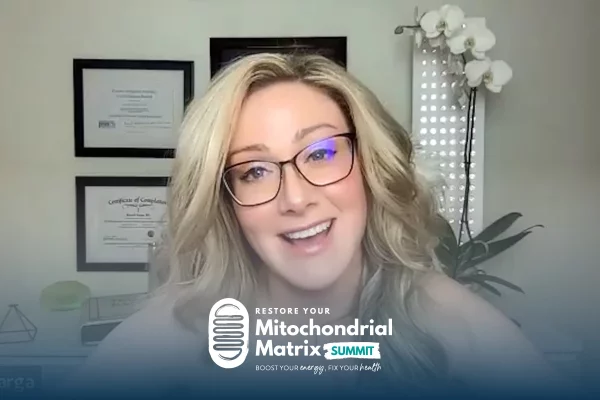Join the discussion below
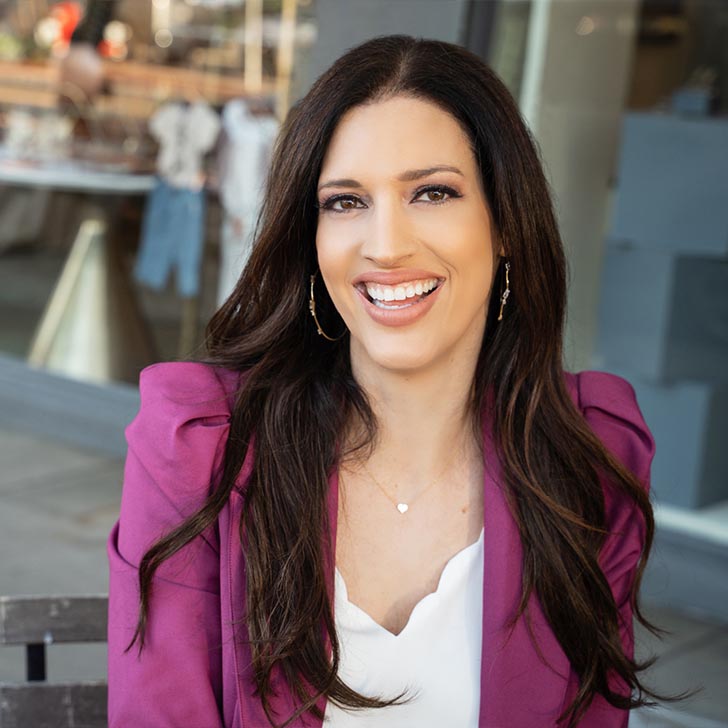
Laura Frontiero, FNP-BC, has served thousands of patients as a Nurse Practitioner over the last 22 years. Her work in the health industry marries both traditional and functional medicine. Laura’s wellness programs help her high-performing clients boost energy, renew mental focus, feel great in their bodies, and be productive again.... Read More

Wendie Trubow, MD, MBA, IFMCP is a functional medicine gynecologist with a thriving practice at Five Journeys, and is passionate about helping women optimize their health and lives. Through her struggles with mold and metal toxicity, Celiac disease, and other health issues, Dr. Trubow has developed a deep sense of... Read More
- An honest and real discussion on how we are exposed to toxins and what to do about it
- The sneaky ways toxins are affecting your health
- How to minimize toxin exposure and HEAL
Related Topics
Air Quality, Alcohol, Bacteria, Beauty Products, Chronic Illness, Deodorant, Food Quality, Gluten, Hair Products, Heavy Metals, Infections, Inflammation, Kombucha, Makeup, Mitochondria, Mold, Nail Polish, Parasites, Personal Care Products, Plastic Water Bottles, Skincare Products, Stress, Toothpaste, Toxic Cleaners, Toxins, Water QualityLaura Frontiero, FNP-BC
Welcome back to another episode of the Restore Your Mitochondrial Matrix Summit. I’m your host, Laura Frontiero. I’m bringing you experts to help you boost your energy and fix your health, so you can build the life you love. Today, My special guest is Dr. Wendie Trubow. Hi, Wendie, welcome to the summit.
Wendie Trubow, M.D., MBA
Hi, Laura, great to be here.
Laura Frontiero, FNP-BC
It is so good to have you here. You’re new in my circle of friends in my life. I met you a couple of months ago at a medical conference, and it was instant attraction. I knew I had to have you in my circle of women. And so I’m really glad to have you here. You are a specialist in all things toxins. You’re really big specialist on mitochondria and basically antiaging and reversing the effects of toxins in the body. So this is what everyone wants to know. And I wanna introduce you to our audience. You specialize in helping women optimize their health and lives as a functional medicine gynecologist. You actually have a Western medicine MD background and functional medicine. So incredible. And you had your own struggles with mold and metal toxicity, and celiac disease, and other health issues. And that helped you really have a deep sense of compassion and expertise for what your patients were facing, and that was a really a big part of your journey to functional medicine, it sounds like.
Wendie Trubow, M.D., MBA
Yeah.
Laura Frontiero, FNP-BC
Yeah. Well, you have a book. It’s right there behind you on the shelf. This is a fantastic book. You’re the co-author of the “Dirty Girl.” I love the title of your book. “Ditch the Toxins, Look Great, and Feel Freaking Amazing.” And that’s my experience of you, is just saying how it is. You wanna feel freaking amazing. You’ve got a clinic in Massachusetts, you have a telemedicine clinic, and you have online courses for women all over the world. So welcome, welcome, huge warm welcome to summit.
Wendie Trubow, M.D., MBA
Thank you. I’m just so excited to be here. I was like, “Yes, I’m talking to Laura today.” Yay!
Laura Frontiero, FNP-BC
I know, you look at your calendar and go, “I get to hang out with my friend.”
Wendie Trubow, M.D., MBA
Exactly, so this is perfect.
Laura Frontiero, FNP-BC
I know, and I just have to say, I’ma tell a quick story to the audience before we jump in. So my very first experience of you… Right. The very first time I met you, you were sitting directly across from me at a dinner that we were both at for practitioners. really fancy restaurant, fancy steakhouse. The seafood tower that they brought was insanely amazing. And I looked at you and you brought your own food and you And I looked at you and you brought your own food, and you were not about to be… What did you call it? Gluten bombed or-
Wendie Trubow, M.D., MBA
Glutenized.
Laura Frontiero, FNP-BC
Glutenized at a restaurant because you were one of the speakers at the event the next day, and you had a big talk to give, and you weren’t about to let anything take you out of your A game. And so that was my very first experience of you, is a woman who stands for herself, who does whatever it takes for herself unashamedly, unabashedly. You just did what it took, and I’ve got mad respect for that, because a lot of people would feel very intimidated to come to a dinner with a bunch of doctors and bring her own food, ’cause you’d be worried about, “What are they gonna think about me? Am I gonna be judged?” I’m just sharing this story because I know there’s people watching right now who have celiac disease, who have… They know they have food intolerances and they just don’t wanna be troublesome for other people, and they don’t wanna bring attention to themselves, but you just do what it takes to take care of yourself. So I applaud that and nobody judges you for that. In fact, we all have really deep respect for you for doing that. And you crushed it at your talk the next day, You didn’t get glutenized.
Wendie Trubow, M.D., MBA
But Laura, you bring up a really, really important point ’cause, okay, I would say 99% of the people listening don’t have celiac. 99.9% of the people probably don’t have celiac or don’t know they have celiac. And maybe there’s 2% of the people who have gluten sensitivity or maybe 5 or 10, but everyone else listening still runs into times when they might not be able to do what works for them or might feel funny about doing what works for them, right? You go to the holiday party and it’s so not food that you eat or you go to your friend’s house and you know that the food’s gonna be terrible, and you don’t wanna eat a bunch of macaroni and cheese. or there’s a lot of ways in which, as women, we do things that don’t work for us ’cause we don’t wanna make a fuss. And my personal goal is to inspire and empower women to feel freaking amazing. But you can’t do it if you’re always getting set back around food, right? You do something, it doesn’t work for you, you’re set back. Then you gotta crawl out of the hole. You get back to good, and then another life event happens. So it’s not just if you have food sensitivity. It’s like you’re on a special program. I always say to people, “Blame your doctor.” Just say that your doctor said you had to be on this special program because it works for you, right? There’s a lot of peer pressure out there.
Laura Frontiero, FNP-BC
There is, but you stood up for yourself and did what it takes, and I noticed, and it was amazing.
Wendie Trubow, M.D., MBA
Thank you.
Laura Frontiero, FNP-BC
And that’s in that moment where I said, “I want her in my life because she’s bold, and courageous, and doing whatever it takes.” So we’re gonna have a good talk today about mitochondria, about why they’re important, about impaired mitochondria function. But why don’t we start with toxins? Because that’s your specialty. This is the reason that you ordered or that you brought your own food to that restaurant. So start by sharing what are toxins.
Wendie Trubow, M.D., MBA
I love this question. Anything that you ingest, or put on your body, or put in you, around you could be a toxin. So too much of a good thing can be bad, right? For me, gluten is a toxin. For everyone, heavy metals are toxins, toxic cleaners. Nail polish has toxins. Beauty products have toxins. And before we dive too far in, Laura, we really need to set the foundation for this, that mitochondria do not do well when they get toxin. They don’t like it when they’re flooded, and they don’t function as well. And then you go, “What difference does that make?” Well, your hair, your skin, your energy, your sex drive, your vitality, your joy de vivre, your ability to live a life of contribution and empowerment goes down when your mitochondria are unhappy. So we have to set the stage of saying all of this really does impact the mitochondria profoundly. So toxins are anything that you’re exposed to that’s serving to harm you.
Laura Frontiero, FNP-BC
So that’s a wide range of things. Yeah, and I would even say, in that group, I would put low grade chronic infections, bacteria, parasites, mold-
Wendie Trubow, M.D., MBA
Stress.
Laura Frontiero, FNP-BC
Stress. Stress is a toxin. Okay. So where do we wanna go from here? Let’s unpack toxins, maybe put ’em in some categories and talk about how they’re impacting your health.
Wendie Trubow, M.D., MBA
Yeah, let’s talk about the ways that you’re exposed. I think it’s easiest. I put the ways you’re exposed into three buckets, and then I put the toxins themselves into three buckets. You can kind of start to… I always think of it like that game in the arcade where you drop a ball in and then it trickles down, and you figure out where it winds up. So the three ways you get exposed to toxins, one, what you put in your body. That’s your food, the quality of it, how you’re digesting and absorbing it, your liquid. That includes water. Are you drinking from single use plastic water bottles? What’s the quality of the water itself? And then alcohol or kombucha from a plastic water bottle.
Anything that you’re putting in you could be a potential toxin and horrifying, horrifying, Laura. In 1989, so we’re talking than 30 years ago, go Boston, a Massachusetts study found that one in six deaths was due to air or water quality. One in six people were dying, and that was 30 years ago, and it’s only gotten worse. So, okay, what you’re put in in your body. Then what you put on your body. And if you’re female, you have likely been exposed to about 150 toxins before you start your day. When I say start your day, meaning start your job, whatever your job is, if you it’s taking care of the kids, if it’s going to a paid work, if you’re leaving the house, whatever. But once you’ve gotten ready in the morning, you’ve been on exposed on average to about 150 toxins.
Laura Frontiero, FNP-BC
Whoa, whoa, whoa, whoa. Okay. Where 150 toxins coming from? Break that down.
Wendie Trubow, M.D., MBA
That is a great question.
Laura Frontiero, FNP-BC
I know people have heard that before, but let’s talk about where they’re at.
Wendie Trubow, M.D., MBA
Look at the things that you wash your hair with, dry your hair with, put in your hair to keep it from being flyaway, then hold it in place, the things that you’re putting on your skin to wash, tone, moisturize, makeup, what are you brushing your teeth with. Everything that you use. What are you using for deodorant? One of my kids said to me… Another one of my kids really needed antiperspirant. And I was like, I am not gonna give a kid antiperspirant, because that means you are not sweating, and not sweating is really bad for detox. I said, but maybe they need some deodorant ’cause they’re stinky, right? My kid’s entering puberty. He’s a stinky little thing. So all of those things that you put on your body. I mean nail polish. It broke my heart. I used to… I’m a surgeon, so I have precise aim, and I used to do my nails every Sunday, drove my husband nuts. I did my nails laid with my hands on top of the covers until I fell asleep. And then in the morning, I’d have perfect nails. And I did it myself, and every week was a different thing. And then I was like, “Oh, it’s not natural.” It’s not natural, right? There’s a lot of chemicals, even though it’s a better form, it was still too much for my system ’cause I had mitochondrial disease.
Laura Frontiero, FNP-BC
And even before we jumped on this call, we had a little talk about eyelashes, and there’s a lot of different options out there right now for people, from glue-on to now the magnetic ones, and both you and I are wondering what heavy metals are in those magnetic eyelash, the liquid liner that sticks it on, that’s getting into your bloodstream and causing a toxic burden. So I mean, it comes in so many forms, Wendie.
Wendie Trubow, M.D., MBA
Yes, it’s really everywhere, and it can feel very overwhelming, especially if you’re highly functioning, and you’re busy, and you’re like, “Oh my god, I can’t deal with this.” So let’s just pause here for a second and take one little step down the rabbit hole to say it’s tempting to wanna throw everything out. Don’t do that. Don’t do that because then you have to replace everything. Right?
Laura Frontiero, FNP-BC
Right.
Wendie Trubow, M.D., MBA
So what I would say is pick the thing you’re running out of, whatever that is. For me, it’s mascara. Every six weeks, like clockwork, I get rid of my mascara, ’cause I had it on auto ship from my boyfriend, Jeff. Jeff’s my boyfriend. He sends me everything I want, super nice guy. So anyway, I had it on an auto ship, and then I was like, “Okay, it’s time to level up, right?” So whatever you’re running out of or whatever you’re about to get a shipment of, that’s the thing to look for. What can I clean up? Okay.
Laura Frontiero, FNP-BC
While we’re on that topic, that reminds me things that people auto ship, feminine hygiene products as well.
Wendie Trubow, M.D., MBA
Yes, yes, yes.
Laura Frontiero, FNP-BC
Toxin.
Wendie Trubow, M.D., MBA
Think about it. You don’t wanna put non-organic food in your mouth, but you put it in your vagina. So cotton that’s been treated with pesticides, you’re absorbing the pesticides. So yes, go for organic, 100% cotton wherever possible. Right? So yeah, you totally. You nailed that one.
Laura Frontiero, FNP-BC
I just keep thinking of more things as we talk. There’s so many things.
Wendie Trubow, M.D., MBA
It’s nonstop, honestly. So that’s the stuff you put on your body. Basically, anything that you put on your body and your clothing. Anything you put on your body is a potential source of toxins. And then there’s the stuff around you, which is another-
Laura Frontiero, FNP-BC
Oh, wait, wait, wait, wait. wait, wait, wait, wait, clothing. Whoa, whoa, whoa. Hold on a second. So what comes to mind for me is what I call disposable clothing. So you go into the stores that shall not be named where everything is like $19, and it’s literally made out of plastic. The clothes are made out of plastic. They’re not made out of cotton. So that’s your I need one outfit one time, and the first time you wash it, it’s gonna fall apart. Remember, we go shopping in those places in our 20s and 30s. I don’t shop there anymore. But yeah, clothing has toxins, and the dyes, the dyes as well.
Wendie Trubow, M.D., MBA
The dyes. I used to love that new clothing smell, but it’s super toxic. It’s formaldehyde. And yes, I wanna be well-preserved, but not like that. That is not how I wanna be like looking good because I’ve been basically replaced with the stuff they put in you when you die. I don’t want that. So it’s really important to wash your clothes well before you wear them for the first time. We pretty much put a fatwa on on dry cleaning. If it can’t be washed, we don’t buy it, period.
Laura Frontiero, FNP-BC
Yeah, I hear you.
Wendie Trubow, M.D., MBA
‘Cause otherwise it’s chemical. And so I was so excited, Laura. There’s this natural dry cleaner down the street from my house, so I called them. I’ve just now had the brain space to look up and sort of go, oh, right. So I actually got the time to call them, and I called ’em. I’m like, “Hey, hi, what do you use?” And he tells me this whole long name. And he’s like, “It’s super natural.” I said, “Okay, great.” I go look it up. He is a big fat liar. It is not supernatural. It’s a derivative of formaldehyde. And I was like, “Thank you very much. Great talk, you know.” And we didn’t go there. So it’s not possible to do dry cleaning naturally. You can do dry shampoo naturally. Super easy. Arrowroot, whatever color you are. I’m dark, so you either put charcoal or cacao in it, and any fragrance, like natural tea tree oil or other oil that you want it to smell like. Yes, you can do dry shampoo easily, but you can’t do dry cleaning naturally. Doesn’t exist.
Laura Frontiero, FNP-BC
Okay. So we’ve got three buckets, right? So we’ve covered the first two-
Wendie Trubow, M.D., MBA
And the third.
Laura Frontiero, FNP-BC
Eating, inside our body, on our body. Okay, what’s third?
Wendie Trubow, M.D., MBA
Around you. So think of… Let’s start with the bed you sleep in, unless it’s organic, has likely been treated with flame retardant, which is an endocrine disruptor, which ultimately stresses the mitochondria. And even some of the organic beds that say they’re organic, when they track it back into the countries that it comes from, the oversight is very small. And so there’s a chance that you’re also getting pesticides in your organic bed, but you do your best, right? You can only do what you can do. So your bed, your bedding. This is a little interesting. If you’re someone who has seasonal allergies, dust mites love down. And so even though down in and of itself isn’t bad, If you have seasonal allergies and it’s triggering you as a toxin that way, you can react to your down comforter. So I always say replace it with silk.
Dust mites don’t like it. What kind of pillow are you sleeping on? Is it plastic? What’s in your pillow? What is in your pillow? Is it something plastic, or is it down, or is it something else? What are you sleeping on? then you think about, do you live… I know there’s a lot of people in Florida who live on a golf course, but golf courses spray to keep their grass nice and monoculture. Monoculture is totally not what nature wants. Nature wants variety. Monoculture grass needs to be sprayed in order to maintain that. So spraying on a golf course or spraying if you live next to a non-organic farm, or if you live near an industrial plant, these are all places that are off-gassing in some way, or exposing you to chemicals.
Laura Frontiero, FNP-BC
What about just our home in general, the furniture, and the flooring, and the paint?
Wendie Trubow, M.D., MBA
Yep. All of it. There are paints now that are no VOC, meaning no volatile organic compounds. Those are bad for you, toxic to the mitochondria. Everything’s toxic to the mitochondria when you get down to it. if it’s bad for you, it’s bad for the mitochondria. So you can, if you’re doing construction, look for non-VOCs. When you’re cleaning your house, look for clean ingredients. My favorite site is Environmental Working Group, ewg.org, because you can either search by product to see… Every once in a while, you’ll get a product right, and you’ll actually pick the product that’s highly rated. One out of my 300 products that I checked was perfect. It was my physician’s formula bronzer, and I was like, “Oh, go me.” one product.
Laura Frontiero, FNP-BC
One product.
Wendie Trubow, M.D., MBA
One product. Everything else, I was like, “Oh, okay. No, moving right on.” So you can either search by product, see if you did a good job, or you can search by category to see what their recommendations are. So I always recommend going there, look for… Just to make it easy on people, ’cause I’ve already done all this work, my favorite makeup brand is Beautycounter because they sell everything. So for me, it’s one-stop, right? I go and I get everything on my face at Beautycounter, and then the things that we clean our house with is AspenClean. They have everything from dishwashing detergent to dishwasher, and then they have soap, and they have things to clean your floor. They have everything.
Going back to what you asked about, the other stuff that’s off-gassing. There are some ways you can do shopping. Wayfair has an option. It’s kinda buried in the search and filter on the left. Maybe it’s on the left. Maybe it’s on the right. But in the search and filter, you can filter by sustainably sourced. And even within that, you can search by Proposition 65 approved, or you can search by certified organic. So you can shop with Wayfair in ways that won’t off-gas, which is really nice. That’s how we got our most recent couch because we needed a couch, and I was like, “I don’t even have time to go to the store.” So we got it off Wayfair, and it was sustainably sourced. And no flame retardants, which is really important thing.
Laura Frontiero, FNP-BC
Yeah, and you know if it came off Wayfair, it looks good too.
Wendie Trubow, M.D., MBA
Exactly. It looks good, it doesn’t smell, it didn’t off-gas. So it’s really important to think about what you’re doing. And just to note, I think we should probably talk about what are the buckets of toxins ’cause I’m about to say if you’re a weekend warrior and your house was built before 1978, it may have led paint paint in it. So if you’re a weekend warrior who loves to do DIY projects and like, “Oh, I renovated the wall. I ripped out this. I ripped out that.” You’re getting exposed to lead. So it’s really important to understand the sources of toxins, so that you don’t expose yourself unknowingly.
Laura Frontiero, FNP-BC
Yeah, absolutely. My dad is a general contractor, from the ’60s and ’70s. and when we tested him for metals, sure enough, not surprising that there was a high level.
Wendie Trubow, M.D., MBA
Oh I’m sure.
Laura Frontiero, FNP-BC
Yeah, yeah.
Wendie Trubow, M.D., MBA
Yeah. They’re pretty common. So that’s the first bucket, is heavy metals, and that’s… We’re looking primarily at lead and mercury, but we’re also looking at arsenic, Valium, and cadmium. But I would say tier one is lead and mercury, tier two is arsenic, Valium, and cadmium. And lead is primarily found in homes built before 1978, industrial processes, lead pipes. There are still 10 million homes in the United States that have lead pipes. It’s 2022.
Laura Frontiero, FNP-BC
So it’s in our water. So it’s in-
Wendie Trubow, M.D., MBA
It’s in our water. It’s in our water. It’s contaminated in the ground. So you can get exposed in a lot of different ways. Also, if you came from someone who had high lead exposure, meaning if you were born to someone who had high lead, and it does cross the placenta, and then if they nurse you, go for them, ’cause it’s great. However, it is a detox event for them, and they release toxins into the breast milk, which you then drink.
Laura Frontiero, FNP-BC
I just had a new appreciation for the fact that I was raised in a log cabin. No joke. We had wood walls. No paint. Go mom and dad. That’s awesome.
Wendie Trubow, M.D., MBA
Yes, totally, right?
Laura Frontiero, FNP-BC
Yeah. Yep.
Wendie Trubow, M.D., MBA
Although one of the guys I did a summit with grew up on a non-organic farm and said he was so sick by the time he left his parents home because of all the pesticides that he was being exposed to. He’s like, “I actually felt better when I moved away.” So it’s these subtle things. Think about it. Your neighbors… I love my neighbor. He lies on the ground and picks weeds. He and his father. So I was like, “Oh cool. It’s a natural yard, right?” No, I drive home one day, and I see he’s got a can around up, and he’s spot spraying. And I’m like, “Do I say something or do I not say something?” I didn’t say something ’cause I honestly never talked to him anyway. We’re like two houses away. But even your neighbors spraying their yard, if they mass spray, can drift over to you. So these are the more about the things that are around you.
What’s being sprayed in your environment? Okay, so going back to the categories, the lead and then the mercury is fish in fillings or being born to someone who had mercury. And the heavy mercury fish are mahi mahi, that delicious fatty tuna belly, Chilean sea bass, swordfish. It’s so funny. This is what I do for my career, right. I’m evaluating people for their toxin. So I’ll say to women, “Okay, do you eat sushi?” “Yes.” “How often?” “Only twice a week.” “Okay, you’re eating the heavy mercury fish.” “Only twice a week.” And I’m like, “Oh, buddy one serving is enough for most people for more than a month.” Meaning one serving of the heavy mercury fish, six ounces, has enough mercury in it that it should keep you satisfied for mercury for at least a month.
Laura Frontiero, FNP-BC
Satisfied for mercury.
Wendie Trubow, M.D., MBA
Yeah, like you got your quota.
Laura Frontiero, FNP-BC
While we’re on that topic, so you might go for some salmon instead.
Wendie Trubow, M.D., MBA
Yes.
Laura Frontiero, FNP-BC
But I challenge you to find wild caught salmon at a sushi joint and not farmed, and that’s full of all kinds of pollutants and toxins. And so I’m to the point now where I don’t need it anymore.
Wendie Trubow, M.D., MBA
Yeah, it’s a little bit of damned if you do, damned if you don’t, Laura, because if you think about it, the farm raised has its issues, but the wild caught is full of plastic. Even though the salmon doesn’t have mercury, it’s got plastic. So my general philosophy… It’ll make you nuts. I mean, look, we wrote a book on it, right? It makes you nuts. And so my general philosophy is you do the best you can with the information you have. You don’t sweat, you don’t sweat anything, except sweating to get the toxins out. All you do is like sweat, go sweat, exercise, sauna, sauna blanket, Epsom salt bath, doesn’t matter. Sweat.
Laura Frontiero, FNP-BC
Sweat, but don’t sweat it. I love it.
Wendie Trubow, M.D., MBA
But don’t sweat it.
Laura Frontiero, FNP-BC
I love it. Okay, so what other buckets of toxins should we cover?
Wendie Trubow, M.D., MBA
All right, so we got the metals and then there’s the mycotoxins. Mycotoxins are the toxins that your body, that get put out in your body when you’re exposed to mold. So when you have mold in your body, you make mycotoxins, and you can measure them. And they can make you sick as hell and stress the mitochondria. So we wanna evaluate around you. You think about buildings. I heard a report that over 50% of buildings in the United States have some type of mold damage. Right?
Laura Frontiero, FNP-BC
I believe.
Wendie Trubow, M.D., MBA
So mold in buildings. Schools are super moldy. Dorms are super moldy. So, right, there isn’t a human who’s grown up without being exposed to a school. And then if you go to college, you go to the dorms. And then you have a 50-50 chance of having a building with water damage. So pretty much you can assume that you’ve been exposed. And then about 30 to 40% of the population has genes that make them more susceptible and react to it. And I got those genes. I got all the bad genes. So it can cause hair loss. It can cause… It’s implicated into degenerative diseases, like Alzheimer’s, Parkinson’s, multiple sclerosis, dementia, straight up dementia, brain fog, thyroid dysfunction, rashes, difficulty losing weight. You name it and pretty much mycotoxins are implicated in it.
Laura Frontiero, FNP-BC
Oh yeah.
Wendie Trubow, M.D., MBA
It’s horrifying. And then the third bucket is all the other stuff. So that is your gasoline fumes, your paints, your nail polish, your beauty products that are endocrine disruptors, the clothing that has formaldehyde in it, the herbicides, pesticides, insecticides. That’s where glyphosate falls. It’s the most commonly used herbicide in the world. In 2014, there were 250 million pounds used. You can’t even figure that number out. It’s like, what is that? Right?
Laura Frontiero, FNP-BC
Yeah.
Wendie Trubow, M.D., MBA
That’s how much was used agriculturally.
Laura Frontiero, FNP-BC
you can’t escape it. I mean it’s literally impossible, at least in the United States.
Wendie Trubow, M.D., MBA
Yep.
Laura Frontiero, FNP-BC
Yeah.
Wendie Trubow, M.D., MBA
And then the other thing I wanna go back to around mycotoxins, a lot of grains are moldy because you think about it, they get threshed, and they sit, and they’re moldy as they sit. And that’s what you-
Laura Frontiero, FNP-BC
Corn.
Wendie Trubow, M.D., MBA
Corn, oats, wheat, all of it’s moldy. And so if you’re eating a lot of grains, you can get exposed to it that way. Coffee’s moldy, a lot of it, unless it’s tested.
Laura Frontiero, FNP-BC
Yeah, we’ve got some good options for coffee.
Wendie Trubow, M.D., MBA
Yes.
Laura Frontiero, FNP-BC
You can get Lifeboost. What else you got?
Wendie Trubow, M.D., MBA
There’s Bulletproof. There’s purity.
Laura Frontiero, FNP-BC
Yeah.
Wendie Trubow, M.D., MBA
I don’t even drink coffee, but those are the two I know of.
Laura Frontiero, FNP-BC
Lifeboost girl over here. Good stuff. Okay, so we’ve got all these buckets, these three buckets of toxins.
Wendie Trubow, M.D., MBA
Yeah.
Laura Frontiero, FNP-BC
All right, now how are they impacting our health? You mentioned briefly endocrine disruptors. We could go down that path and talk about what they’re doing to your organs, to your mitochondria, to your hormones.
Wendie Trubow, M.D., MBA
Yeah, I mean, let me share with you. Before I got diagnosed, I really was sick head to toe. So I lost about half the hair on my head. I had a rash on my face that would not quit. I had brain fog. I had fatigue. I had no sex drive. I could still have an orgasm, but I didn’t want to. I was like, “Just don’t bug me. I’m tired.” I couldn’t lose… I was not overweight, but I was about 15 pounds heavier than I am now. And it didn’t feel good. I was like, “It doesn’t feel good on my body.” I don’t feel like I look good. I had this extra chin. It doesn’t feel like I look good. And I had messed up periods. I had crazy hot flashes. My sleep was disrupted. I just was a mess, right. And in the discovery of, or the exploration of what on earth is going on here, ’cause this is not normal.
We say you’re meant to be vital, vibrant, healthy, alive, interested, and able to perform intimacy until you’re at least a hundred. I was no where near that standard. And when we did this evaluation, I had heavy metals, mycotoxins, and a whole bunch of others. Right? And really, because we’re talking about mitochondria, when you think about when mitochondria are not healthy, you get tired. You don’t recover as well from stressors. You don’t sleep as well. It impacts everything down the line. And you don’t do detox as well because your liver uses… Your liver, your brain, your muscles are all heavy utilizers of mitochondria or high concentrations of mitochondria. And so if they’re not functional, your liver can’t do its job to detox you. It just piles up. You pile it on.
Laura Frontiero, FNP-BC
So there’s hope, right?
Wendie Trubow, M.D., MBA
There’s always hope.
Laura Frontiero, FNP-BC
We can minimize our exposure and we can heal. So, can you share with us how to do that?
Wendie Trubow, M.D., MBA
Sure. Love to, because there’s always hope. So it’s really important. You can’t really do detox until you’ve managed what I’ll call the platforms of life. So that is eating properly, handling your gut, making sure that you’re pooping every day, two to three times a day. So eating well, pooping, making sure that your minerals and nutrients are balanced, that you’re getting what the body needs. The mitochondria love CoQ10. it loves carnitine. So giving the body what it needs, making sure you sleep, because if you don’t sleep, you don’t drain toxins out of your brain, and you don’t rest and recover. Making sure that you’re not an inordinate stress ball. Right? So being hard on yourself, stressing about things that you can’t control, those actually take a toll on your adrenals, your liver, and your gut, and it shuts down detox, which means your mitochondria don’t heal.
Laura Frontiero, FNP-BC
Not at all.
Wendie Trubow, M.D., MBA
Having a relationship with yourself that’s healthy. I always say to people who have a really loud conversation about themselves, take on my view of you instead of your view of you. Take on someone else’s view ’cause it’s so much more empowering than your own view at times, If you can’t get outta your own way, look at yourself through another lens. So having a relationship with yourself that’s healthy and then having relationship with others that’s healthy. These are the platforms. And then having a why. Why would you do this? Why does it matter that you work on your health, and that you bring your own food to a restaurant, and be weird, right? Why does it matter? ‘Cause you are living for something bigger and you’re out to make a difference. So handle your platform, and then we talk about, okay, what’s a girl to do, right? You want to figure out the major sources of exposure in your life. If you live in a house built before 1978, you’re gonna wanna invest in making sure you clean the walls and clean the floors routinely, filter the air, filter your water, eat high quality food.
If you are eating heavy mercury fish, stop. If you have mercury fillings in your mouth, get them taken out by a biologic dentist, not just the dentist who’s like, “Sure, I can take that out.” I did that once, I was so sick. And then I went to a biologic dentist who protected me. So make sure you’re protected, so you don’t get a big body burden of mercury on top of already having mercury. Look to see how you can clean up what you’re putting on your body. As you run out, level up. Only as you run out. Don’t don’t do a clean sweep unless you have a personal assistant and unlimited funds, in which case, great. Sic them on that and say, “Okay, you have 30 days to transform my health.” Right? And then look to see what’s around you that you can control. And that’s the most important thing, what you can control. So my daughter’s car died. We drove it into the ground, right? It was like 15 years old. It has 180,000 miles on it. It i going no farther. And I’m like, “I’m not putting $6,000 into it.” So we got her a new car. “and guess what new cars have.
Laura Frontiero, FNP-BC
Lots of VOCs.
Wendie Trubow, M.D., MBA
Yes, 300 different chemicals that off-gas indefinitely. So I was like, “There’s no way that you’re gonna drive around in this car unless we get you an air filter.” So we have control over that, right? I can’t control the new chemicals, but I can control filtering the air. So look to see what you can control. And I’m like, “Hey, if you feel like driving with the windows down, it’s good, right? Let the car air out indefinitely ’cause it keeps going.”
Laura Frontiero, FNP-BC
Or at least when you get in your hot car, open all the windows and let that air out before you close it in and turn on the air conditioning.
Wendie Trubow, M.D., MBA
Yeah, exactly. Quick, easy hack.
Laura Frontiero, FNP-BC
Exactly.
Wendie Trubow, M.D., MBA
I mean it’s so funny ’cause I was seeing all these things that say vegan leather, vegan leather, vegan leather. I’m like, “Ah, that is plastic by another name, guys.” Vegan leather is not any better for you. It’s just better for the animals. It’s not better for you.
Laura Frontiero, FNP-BC
Right.
Wendie Trubow, M.D., MBA
But it’s a marketing thing. So, look to see what you have control of, and then there are specific things you can do, and these are not the popular things, Laura. Okay, so I just wanna acknowledge up front that most women, when I say this to them, they get mad at me. Okay, don’t get mad at me, right? I’m just the messenger. Alcohol’s really bad for you.
Laura Frontiero, FNP-BC
What, I can’t have my glass of wine every single night?
Wendie Trubow, M.D., MBA
It’s a little much.
Laura Frontiero, FNP-BC
Yeah.
Wendie Trubow, M.D., MBA
Yeah. So, and then you have to distinguish, are you looking for the experience or are you looking for a stress reducer? Because we can replace your need to have a stress reducer with something that will reduce your stress. And if you’re looking at the experience, we can look for a non-alcoholic wine. We can look at a spritzer that has a tenth of the alcohol in it. We can look at different ways to satisfy that experience, but the alcohol in and of itself is really toxic for you. A, it’s a toxin, and B, your liver goes, “Oh wait, I gotta deal with the toxin instead of all the toxins. I gotta deal with this immediate toxin that could kill me.” So it’s really important to… It’s really important to not make your body work harder than it needs to.
Laura Frontiero, FNP-BC
What else is not popular?
Wendie Trubow, M.D., MBA
Sugar, sugar, sugar, sugar. Yeah, those two things, alcohol and sugar, like the devil.
Laura Frontiero, FNP-BC
So what kind of sugar? What about coconut sugar? What about-
Wendie Trubow, M.D., MBA
Yes, still sugar.
Laura Frontiero, FNP-BC
Still sugar.
Wendie Trubow, M.D., MBA
Still sugar.
Laura Frontiero, FNP-BC
What about organic cane sugar? What about having all these different sugars? what about monk fruit?
Wendie Trubow, M.D., MBA
Monk fruit is not sugar and does not raise your blood sugar. So monk fruit, stevia are both fine. We actually are growing stevia in our front yard. It is so sweet, like so sweet. So you can use those. They do not raise your blood sugar, but any form of sugar will, other form of sugar, so coconut, maple sugar, whatever.
Laura Frontiero, FNP-BC
Honey.
Wendie Trubow, M.D., MBA
Yeah, brown sugar, maple syrup. We tapped our trees this year and boiled it down. Man, that stuff is sweet.
Laura Frontiero, FNP-BC
Oh my gosh, you so live in Massachusetts. You tapped your trees. We never say that in California.
Wendie Trubow, M.D., MBA
I don’t think y’all have these kind of tree, Right? You don’t have these big…
Laura Frontiero, FNP-BC
There’s maple trees, but yeah, I don’t… I don’t know.
Wendie Trubow, M.D., MBA
I never seen-
Laura Frontiero, FNP-BC
I think it’s the tree of choice. I live in Newton and it was what Newton planted. They planted maple trees. So all along our streets and everywhere, there’s these big maple trees. Right on the corner of my yard, we have three, and we… Well, we might be a generous term. We did not tap it. My husband and son tapped it ’cause I was like, “We don’t want a project.”
Wendie Trubow, M.D., MBA
Right, we’re busy.
Laura Frontiero, FNP-BC
We are busy. Yeah, that’s so sweet.
Wendie Trubow, M.D., MBA
Wine, sugar anything else?
Laura Frontiero, FNP-BC
Stress. But I’m addicted to my stress.
Wendie Trubow, M.D., MBA
I get that. You can be addicted to your stress. You just have to… you can’t be addicted to your stress and complain that you’re not optimally healthy. They are mutually exclusive. So if you really wanna get healthy, you gotta break the chains, right? Start to trust the universe, be kind to yourself, set realistic boundaries. And look, I don’t sweat a lot. My mom walks in my house and I know she cringes every time she walks in, because my house is a mess because I don’t have the time to clean it up. It’s clean, but there’s just stuff I have.
Laura Frontiero, FNP-BC
Clutter, it’s clutter,
Wendie Trubow, M.D., MBA
Clutter, I don’t even know where to put it. I’m like, “I don’t know where to put this, but I need it. I know I’m gonna need it.” Right? I know it drives my mom nuts. My mom’s house is pristine. It’s gorgeous. I love it. I walk in, I’m like, “I wish I could be like this, but honestly, I don’t have the time.”
Laura Frontiero, FNP-BC
Well, you have like four kids too and a busy-
Wendie Trubow, M.D., MBA
I have four kids, yeah, and a bunch of business. I have four kids and now four businesses. So it’s not a priority, right? So I don’t walk in and then I’m a… I do walk in, I’m like, “Oh, I really wish it were neater.” But unless I’m gonna clean it, I’m not complaining. You know.
Laura Frontiero, FNP-BC
Yeah.
Wendie Trubow, M.D., MBA
So it’s like pick the battles.
Laura Frontiero, FNP-BC
Let go of it.
Wendie Trubow, M.D., MBA
Let go, exactly. So stresses, look, I live it, I get it, and it’s not in our favor. It’s just not in our favor. So there’s a lot of things that we can do, and it takes a focus, and it takes a community, and it takes being connected to like-minded people, so you’re not feeling like you’re doing it alone, right? Our practice, we live it. That’s like… I work with people who every day are in the game of how do I clean up my health. Find people, right? That’s why I love you so much, ’cause you’re all about it.
Laura Frontiero, FNP-BC
Yes, I am. Although I did not bring my own food that night ’cause I don’t have celiac disease, but I’ve been thinking about, as we’ve been talking, there’s some non-negotiables for me in my everyday day-to-day. Purified water, number one, absolute non-negotiable. Everywhere I travel, I get purified water delivered to the hotel first thing. Amazon delivers water everywhere you go. So that’s the first thing. a non-negotiable for me is ChapStick. I’m just saying. I was just thinking. What are my non-negotiables? I gotta have moisturized lips, clean ChapStick.
Wendie Trubow, M.D., MBA
Burt’s Bees, super clean.
Laura Frontiero, FNP-BC
Pooping every day. Pooping every day is a non-negotiable for me.
Wendie Trubow, M.D., MBA
Yes.
Laura Frontiero, FNP-BC
But at all costs, I must eliminate that toxin for my body or that day is gonna be cloudy, and tired, and not productive. And then whole, real foods. Those are kind of my big non-negotiables. As long as I have those four things… Oh, and I need to have a bed. I don’t like to sleep on the sofa. I like to have a bed.
Wendie Trubow, M.D., MBA
How often does that come up?
Laura Frontiero, FNP-BC
Well, if you’re staying at somebody’s house or… Yeah, I would go to a hotel and get a bed. I cannot sleep on a sofa. It just doesn’t-
Wendie Trubow, M.D., MBA
No, I like a bed. I like a bed.
Laura Frontiero, FNP-BC
But those are kinda my non-negotiables in life. To your point, work with somebody who’s walking the walk and talking the talk, right? Yeah.
Wendie Trubow, M.D., MBA
100%.
Laura Frontiero, FNP-BC
This has been incredible. Such a fun talk with you, Wendie. I know we could go on and on and talk for hours about this, but bottom line is you’ve outlined the main toxins, the buckets that they’re in, how to not be perfect, because none of us are perfect. Perfectionism isn’t possible, but how to minimize our exposure, and then heal. And I love the platforms that you outline too. All those things have to be in place for you to heal your body. Get your stuff in order. This is really important. Get your relationships in order. Get your mindset in order.
Wendie Trubow, M.D., MBA
Totally, and I just realized, we did a lot of the work for people. We put together a guide so that they don’t have to do the work because it can be overwhelming, like, oh, what pot and pan do I use, right? So if you go on our website, which is fivejourneys.com/promo, we put the guide together. People can just put the email in and download the guide.
Laura Frontiero, FNP-BC
Great, and we’ll have-
Wendie Trubow, M.D., MBA
That’s PDF.
Laura Frontiero, FNP-BC
We’ll have gifts and guides from you on this-
Wendie Trubow, M.D., MBA
Tons of stuff
Laura Frontiero, FNP-BC
On this summit. So you’ll be giving away some of that stuff here. And where else can we find you?
Wendie Trubow, M.D., MBA
Tons of places, Instagram, @WendieTrubowMD, also on Facebook, @WendieTrubowMD, and we have our own podcast, the Five Journeys Podcasts, Live like you matter. And obviously the book is on Amazon, which is “Dirty Girl: Ditch the toxins, look great, and feel freaking amazing.
Laura Frontiero, FNP-BC
So good. So good. Thank you so much for being here, Wendie. It is always fun to connect with you, and I look forward to the next time we see each other, which is gonna be in about a week.
Wendie Trubow, M.D., MBA
Yes, can’t wait to talk to you, Laura.
Laura Frontiero, FNP-BC
You too. Take good care. Bye now.
Downloads
